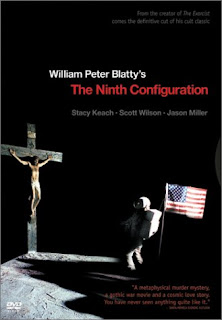
(Spoilers for Moon, as well as Into the Storm [Hint: World War II...we won.])
If Sam Rockwell is your cup o' tea -- and he seems to be for many -- then at least two of him might constitute, as Al Swearengen would approve, "that fucking Black Darjeeling." If, however, like me, you think his acting style boils down to wrapping himself around one physical tic and squeezing until it bursts, Moon will have you bracing for a chore. To his credit -- or more likely, that of first-time director Duncan Jones -- Rockwell dials down most of his annoying habits for the role of Sam Bell, a lone (and lonely) astronaut wrapping up a three-year stint at a lunar station on the moon, excavating supplies of Helium-3, a new source of fuel used on Earth. His only companion, the station's super-computer GERTY (Kevin Spacey, more effective these days as a disembodied voice than a physical presence), Sam gets an unexpected visitor -- a second Sam Bell -- following an accident that leaves him unconscious on the moon's surface.
A bit too much of this comes off as 2001: A Space Odyssey meets Multiplicity, with echoes of Solaris and Gattaca thrown in for good measure. Yet Jones works wonders with a modest budget: he and his production team create an evocative atmosphere of loneliness around Sam, who longs to go home and reconcile with his estranged wife (Dominique McElligott). Moon also succeeds in undercutting our expectations. When tensions build between the two Sams, and Spacey's GERTY starts dissembling a la HAL in 2001, the movie appears to be setting up a nihilistic finish, so it's a pleasant surprise that things don't play out that way.
By emphasizing character over special effects (or, rather, having those effects serve his characters) Jones keeps his eye on the ball and makes Moon a better movie than I was expecting it to be. So why am I still unsatisfied? I think partly because the film's ideas are so intriguing it could have taken them even further (though the budget may not have allowed it). And partly because Rockwell's anti-charisma doesn't hold my interest. He's not as terrible as he is in the titular scene of The Assassination of Jesse James By the Coward Robert Ford: while Brad Pitt and Casey Affleck exude beautifully understated gravitas, Rockwell sweats and stammers like the guilty party in a episode of Perry Mason. Rockwell has a couple of nice scenes with himself in Moon, as one Sam starts to deteriorate and the other one treats him with unexpected compassion. Yet he doesn't pull of the kind of miracle Nicolas Cage did in Adaptation, where splitting his personality into two halves shored up his worst instincts and brought out his best. With Rockwell, more is simply more.

I fell asleep around the halfway point of Into the Storm, HBO's acclaimed Winston Churchill docudrama that holds the distinction of making World War II boring. The director, Thaddeus O'Sullivan, stages the (in)action as though believing we've never lain our eyes on a biopic before. There's a framing device where Churchill (Brendan Gleeson) waits restlessly for the results of his doomed bid for re-election near the war's end, while his wife (the ever-tall Janet McTeer) strains with exasperation. Also included are flashbacks depicting his stern resolve in the face of what seemed like imminent invasion. Into the Storm is the kind of movie that plays off our collective hindsight: emasculated peaceniks are repeatedly trotted onscreen for a derisive chuckle. (At least the John Adams miniseries gave Zeljko Ivanek's reconciler John Dickinson a shred of dignity.) Meanwhile, Churchill's famous quotes originate out of scenarios as contrived as the songs in the films about Ray Charles and Johnny Cash. (You half-expect the Prime Minister to encounter a drug-dealer in a restroom.) Gleeson, one of my favorite actors, doesn't get to play to his strengths here: whether in starring roles (The General, In Bruges) or supporting parts (28 Days Later, Cold Mountain), he thrives on creating characters around his own personality, not hiding inside an icon as he's forced to do here. When it comes to recent screen Churchills, I prefer Rod Taylor's brief appearance in Inglourious Basterds, debating if Goebbels is the Nazi Selznick or Mayer.














